Critical Thinking Application in Corporate Social Responsibility
VerifiedAdded on 2023/06/18
|8
|2330
|180
Report
AI Summary
This report explores the application of critical thinking skills within the context of corporate social responsibility (CSR). It examines the purpose of applying these skills to a CSR case study, emphasizing the importance of analyzing situations and making informed decisions. The report identifies and examines claims related to CSR, such as the relationship between social responsibility and economic performance, the role of stakeholder engagement, and the perspectives of investment analysts. It evaluates the ideas expressed in the case study, highlighting the importance of businesses contributing to the economy, the evolving views of financial investors, the necessity of stakeholder engagement, and the link between financial performance and CSR practices, concluding that critical thinking is crucial for organizations to navigate the complexities of CSR and achieve sustainable success.
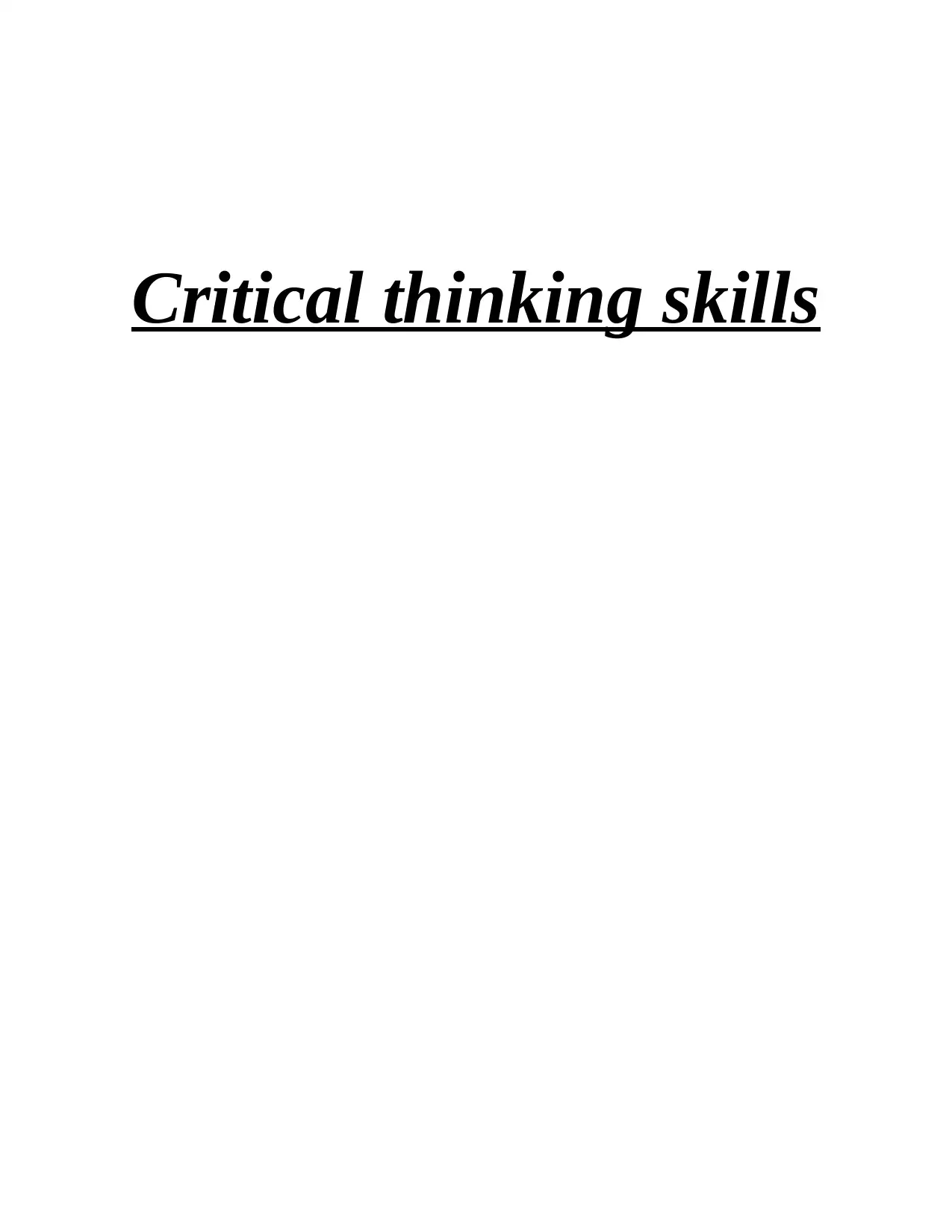
Critical thinking skills
Paraphrase This Document
Need a fresh take? Get an instant paraphrase of this document with our AI Paraphraser
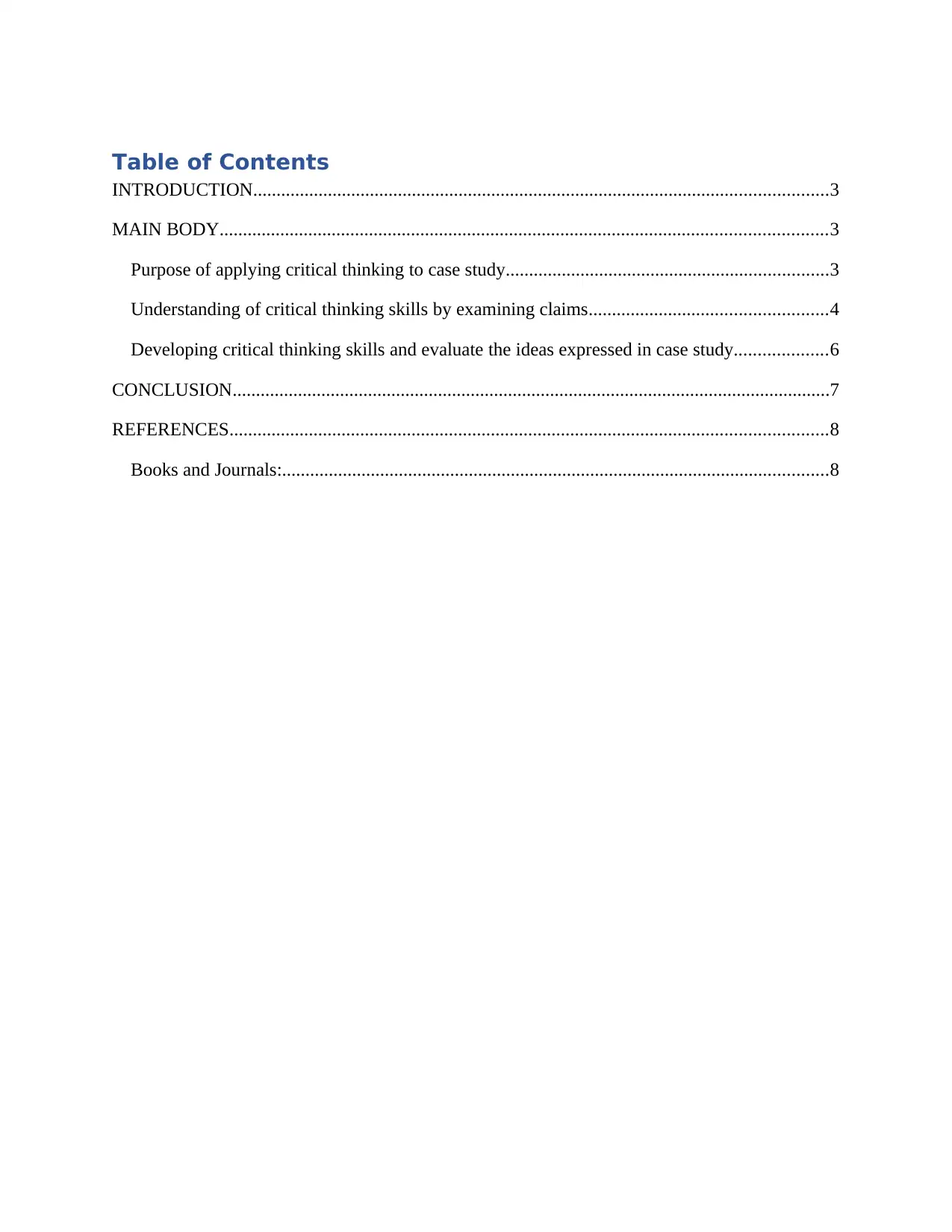
Table of Contents
INTRODUCTION...........................................................................................................................3
MAIN BODY..................................................................................................................................3
Purpose of applying critical thinking to case study.....................................................................3
Understanding of critical thinking skills by examining claims...................................................4
Developing critical thinking skills and evaluate the ideas expressed in case study....................6
CONCLUSION................................................................................................................................7
REFERENCES................................................................................................................................8
Books and Journals:.....................................................................................................................8
INTRODUCTION...........................................................................................................................3
MAIN BODY..................................................................................................................................3
Purpose of applying critical thinking to case study.....................................................................3
Understanding of critical thinking skills by examining claims...................................................4
Developing critical thinking skills and evaluate the ideas expressed in case study....................6
CONCLUSION................................................................................................................................7
REFERENCES................................................................................................................................8
Books and Journals:.....................................................................................................................8
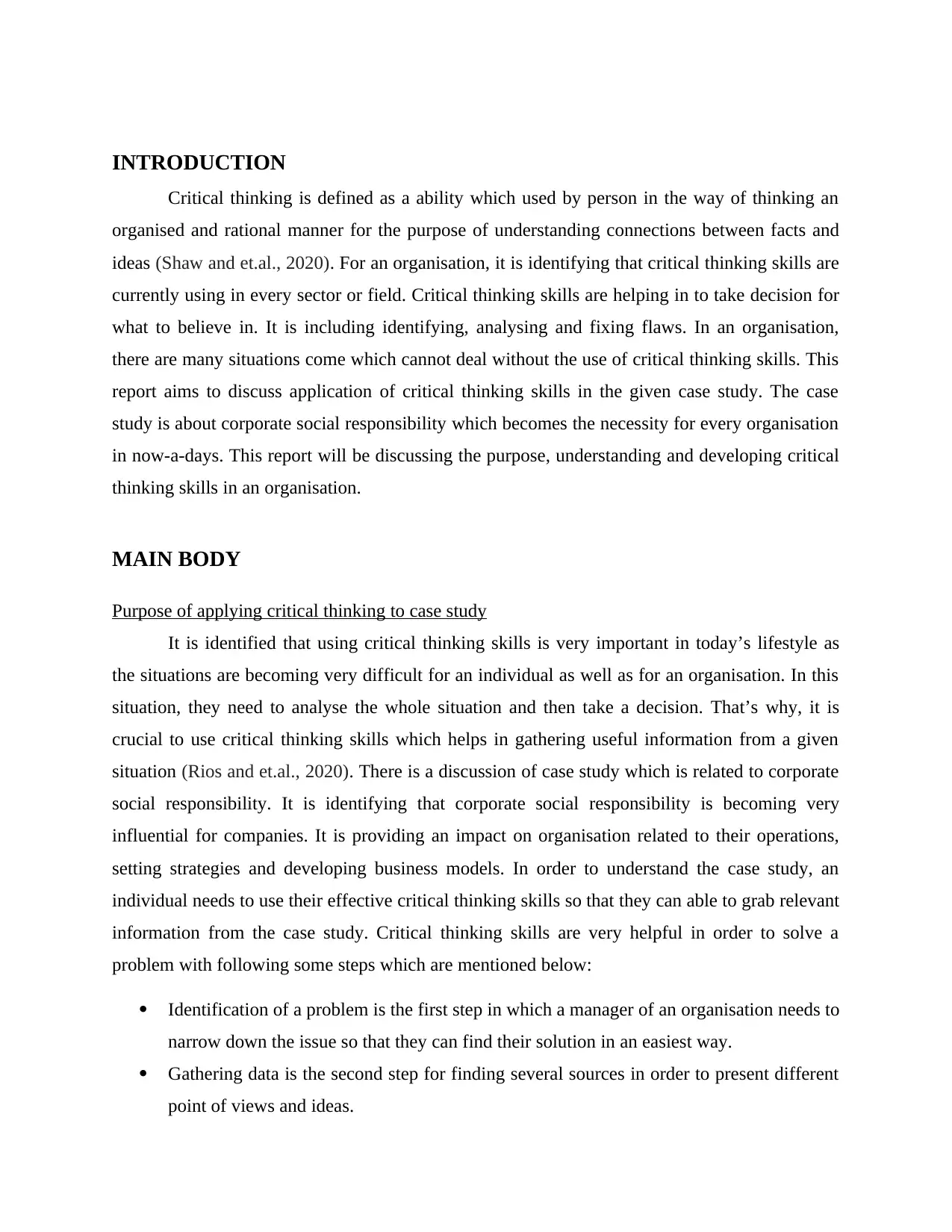
INTRODUCTION
Critical thinking is defined as a ability which used by person in the way of thinking an
organised and rational manner for the purpose of understanding connections between facts and
ideas (Shaw and et.al., 2020). For an organisation, it is identifying that critical thinking skills are
currently using in every sector or field. Critical thinking skills are helping in to take decision for
what to believe in. It is including identifying, analysing and fixing flaws. In an organisation,
there are many situations come which cannot deal without the use of critical thinking skills. This
report aims to discuss application of critical thinking skills in the given case study. The case
study is about corporate social responsibility which becomes the necessity for every organisation
in now-a-days. This report will be discussing the purpose, understanding and developing critical
thinking skills in an organisation.
MAIN BODY
Purpose of applying critical thinking to case study
It is identified that using critical thinking skills is very important in today’s lifestyle as
the situations are becoming very difficult for an individual as well as for an organisation. In this
situation, they need to analyse the whole situation and then take a decision. That’s why, it is
crucial to use critical thinking skills which helps in gathering useful information from a given
situation (Rios and et.al., 2020). There is a discussion of case study which is related to corporate
social responsibility. It is identifying that corporate social responsibility is becoming very
influential for companies. It is providing an impact on organisation related to their operations,
setting strategies and developing business models. In order to understand the case study, an
individual needs to use their effective critical thinking skills so that they can able to grab relevant
information from the case study. Critical thinking skills are very helpful in order to solve a
problem with following some steps which are mentioned below:
Identification of a problem is the first step in which a manager of an organisation needs to
narrow down the issue so that they can find their solution in an easiest way.
Gathering data is the second step for finding several sources in order to present different
point of views and ideas.
Critical thinking is defined as a ability which used by person in the way of thinking an
organised and rational manner for the purpose of understanding connections between facts and
ideas (Shaw and et.al., 2020). For an organisation, it is identifying that critical thinking skills are
currently using in every sector or field. Critical thinking skills are helping in to take decision for
what to believe in. It is including identifying, analysing and fixing flaws. In an organisation,
there are many situations come which cannot deal without the use of critical thinking skills. This
report aims to discuss application of critical thinking skills in the given case study. The case
study is about corporate social responsibility which becomes the necessity for every organisation
in now-a-days. This report will be discussing the purpose, understanding and developing critical
thinking skills in an organisation.
MAIN BODY
Purpose of applying critical thinking to case study
It is identified that using critical thinking skills is very important in today’s lifestyle as
the situations are becoming very difficult for an individual as well as for an organisation. In this
situation, they need to analyse the whole situation and then take a decision. That’s why, it is
crucial to use critical thinking skills which helps in gathering useful information from a given
situation (Rios and et.al., 2020). There is a discussion of case study which is related to corporate
social responsibility. It is identifying that corporate social responsibility is becoming very
influential for companies. It is providing an impact on organisation related to their operations,
setting strategies and developing business models. In order to understand the case study, an
individual needs to use their effective critical thinking skills so that they can able to grab relevant
information from the case study. Critical thinking skills are very helpful in order to solve a
problem with following some steps which are mentioned below:
Identification of a problem is the first step in which a manager of an organisation needs to
narrow down the issue so that they can find their solution in an easiest way.
Gathering data is the second step for finding several sources in order to present different
point of views and ideas.
⊘ This is a preview!⊘
Do you want full access?
Subscribe today to unlock all pages.

Trusted by 1+ million students worldwide
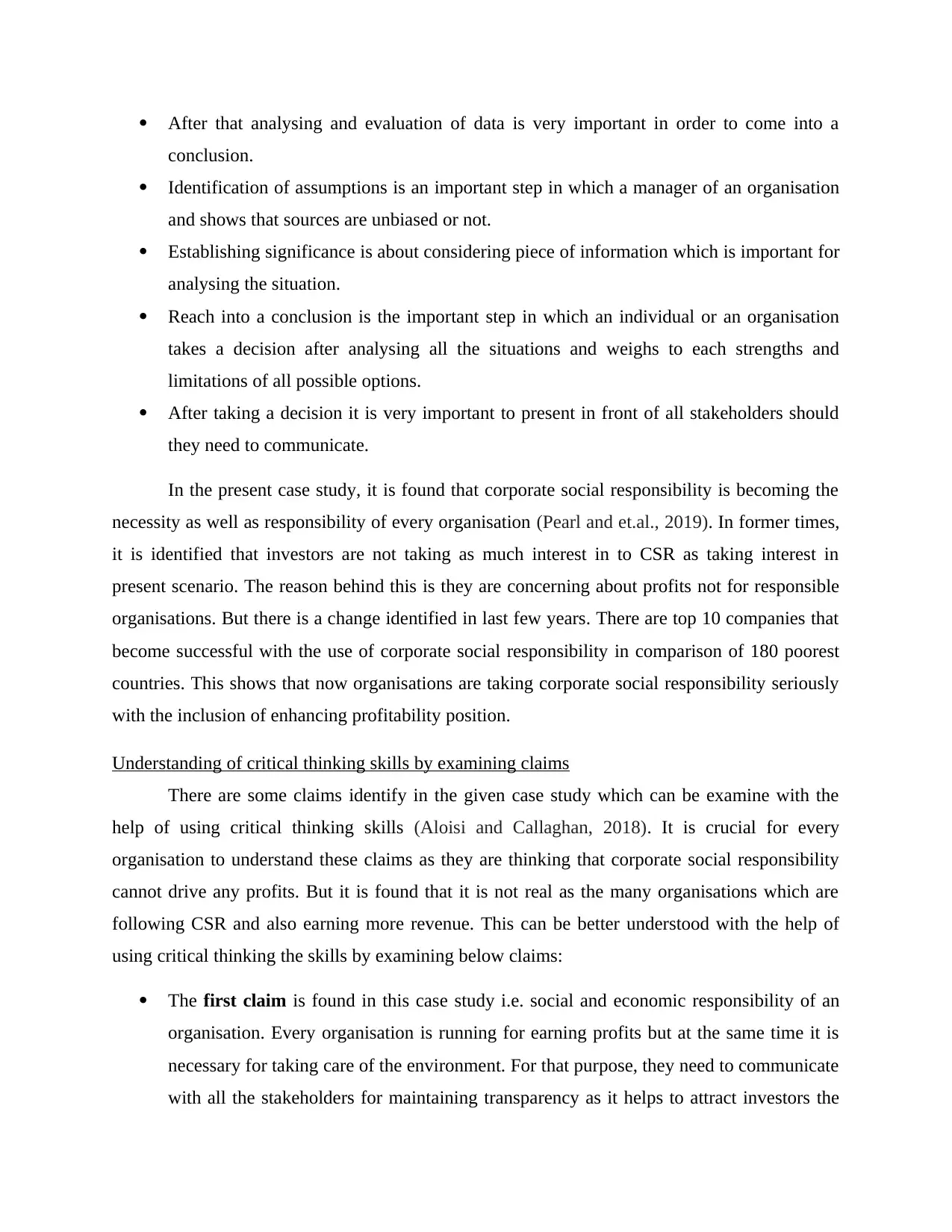
After that analysing and evaluation of data is very important in order to come into a
conclusion.
Identification of assumptions is an important step in which a manager of an organisation
and shows that sources are unbiased or not.
Establishing significance is about considering piece of information which is important for
analysing the situation.
Reach into a conclusion is the important step in which an individual or an organisation
takes a decision after analysing all the situations and weighs to each strengths and
limitations of all possible options.
After taking a decision it is very important to present in front of all stakeholders should
they need to communicate.
In the present case study, it is found that corporate social responsibility is becoming the
necessity as well as responsibility of every organisation (Pearl and et.al., 2019). In former times,
it is identified that investors are not taking as much interest in to CSR as taking interest in
present scenario. The reason behind this is they are concerning about profits not for responsible
organisations. But there is a change identified in last few years. There are top 10 companies that
become successful with the use of corporate social responsibility in comparison of 180 poorest
countries. This shows that now organisations are taking corporate social responsibility seriously
with the inclusion of enhancing profitability position.
Understanding of critical thinking skills by examining claims
There are some claims identify in the given case study which can be examine with the
help of using critical thinking skills (Aloisi and Callaghan, 2018). It is crucial for every
organisation to understand these claims as they are thinking that corporate social responsibility
cannot drive any profits. But it is found that it is not real as the many organisations which are
following CSR and also earning more revenue. This can be better understood with the help of
using critical thinking the skills by examining below claims:
The first claim is found in this case study i.e. social and economic responsibility of an
organisation. Every organisation is running for earning profits but at the same time it is
necessary for taking care of the environment. For that purpose, they need to communicate
with all the stakeholders for maintaining transparency as it helps to attract investors the
conclusion.
Identification of assumptions is an important step in which a manager of an organisation
and shows that sources are unbiased or not.
Establishing significance is about considering piece of information which is important for
analysing the situation.
Reach into a conclusion is the important step in which an individual or an organisation
takes a decision after analysing all the situations and weighs to each strengths and
limitations of all possible options.
After taking a decision it is very important to present in front of all stakeholders should
they need to communicate.
In the present case study, it is found that corporate social responsibility is becoming the
necessity as well as responsibility of every organisation (Pearl and et.al., 2019). In former times,
it is identified that investors are not taking as much interest in to CSR as taking interest in
present scenario. The reason behind this is they are concerning about profits not for responsible
organisations. But there is a change identified in last few years. There are top 10 companies that
become successful with the use of corporate social responsibility in comparison of 180 poorest
countries. This shows that now organisations are taking corporate social responsibility seriously
with the inclusion of enhancing profitability position.
Understanding of critical thinking skills by examining claims
There are some claims identify in the given case study which can be examine with the
help of using critical thinking skills (Aloisi and Callaghan, 2018). It is crucial for every
organisation to understand these claims as they are thinking that corporate social responsibility
cannot drive any profits. But it is found that it is not real as the many organisations which are
following CSR and also earning more revenue. This can be better understood with the help of
using critical thinking the skills by examining below claims:
The first claim is found in this case study i.e. social and economic responsibility of an
organisation. Every organisation is running for earning profits but at the same time it is
necessary for taking care of the environment. For that purpose, they need to communicate
with all the stakeholders for maintaining transparency as it helps to attract investors the
Paraphrase This Document
Need a fresh take? Get an instant paraphrase of this document with our AI Paraphraser
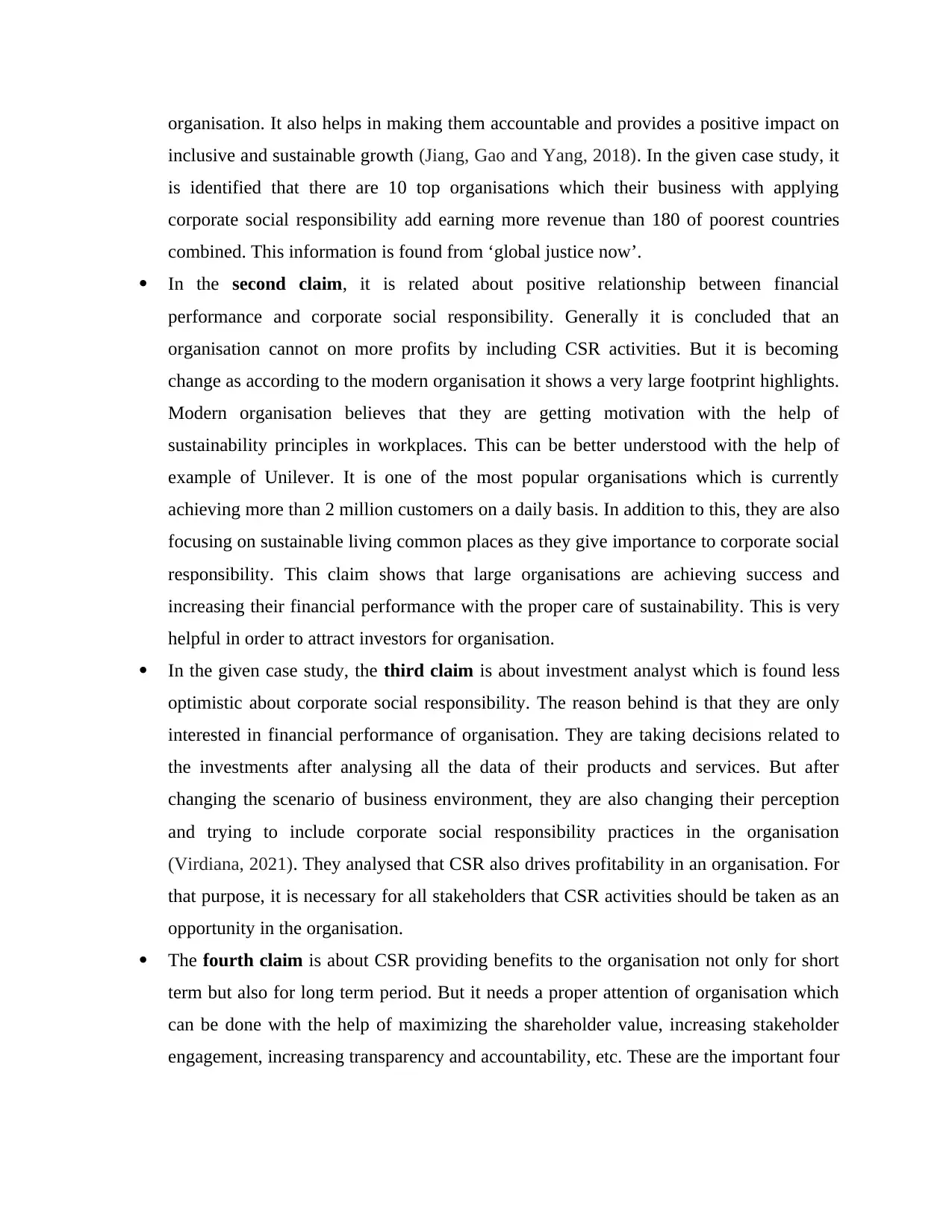
organisation. It also helps in making them accountable and provides a positive impact on
inclusive and sustainable growth (Jiang, Gao and Yang, 2018). In the given case study, it
is identified that there are 10 top organisations which their business with applying
corporate social responsibility add earning more revenue than 180 of poorest countries
combined. This information is found from ‘global justice now’.
In the second claim, it is related about positive relationship between financial
performance and corporate social responsibility. Generally it is concluded that an
organisation cannot on more profits by including CSR activities. But it is becoming
change as according to the modern organisation it shows a very large footprint highlights.
Modern organisation believes that they are getting motivation with the help of
sustainability principles in workplaces. This can be better understood with the help of
example of Unilever. It is one of the most popular organisations which is currently
achieving more than 2 million customers on a daily basis. In addition to this, they are also
focusing on sustainable living common places as they give importance to corporate social
responsibility. This claim shows that large organisations are achieving success and
increasing their financial performance with the proper care of sustainability. This is very
helpful in order to attract investors for organisation.
In the given case study, the third claim is about investment analyst which is found less
optimistic about corporate social responsibility. The reason behind is that they are only
interested in financial performance of organisation. They are taking decisions related to
the investments after analysing all the data of their products and services. But after
changing the scenario of business environment, they are also changing their perception
and trying to include corporate social responsibility practices in the organisation
(Virdiana, 2021). They analysed that CSR also drives profitability in an organisation. For
that purpose, it is necessary for all stakeholders that CSR activities should be taken as an
opportunity in the organisation.
The fourth claim is about CSR providing benefits to the organisation not only for short
term but also for long term period. But it needs a proper attention of organisation which
can be done with the help of maximizing the shareholder value, increasing stakeholder
engagement, increasing transparency and accountability, etc. These are the important four
inclusive and sustainable growth (Jiang, Gao and Yang, 2018). In the given case study, it
is identified that there are 10 top organisations which their business with applying
corporate social responsibility add earning more revenue than 180 of poorest countries
combined. This information is found from ‘global justice now’.
In the second claim, it is related about positive relationship between financial
performance and corporate social responsibility. Generally it is concluded that an
organisation cannot on more profits by including CSR activities. But it is becoming
change as according to the modern organisation it shows a very large footprint highlights.
Modern organisation believes that they are getting motivation with the help of
sustainability principles in workplaces. This can be better understood with the help of
example of Unilever. It is one of the most popular organisations which is currently
achieving more than 2 million customers on a daily basis. In addition to this, they are also
focusing on sustainable living common places as they give importance to corporate social
responsibility. This claim shows that large organisations are achieving success and
increasing their financial performance with the proper care of sustainability. This is very
helpful in order to attract investors for organisation.
In the given case study, the third claim is about investment analyst which is found less
optimistic about corporate social responsibility. The reason behind is that they are only
interested in financial performance of organisation. They are taking decisions related to
the investments after analysing all the data of their products and services. But after
changing the scenario of business environment, they are also changing their perception
and trying to include corporate social responsibility practices in the organisation
(Virdiana, 2021). They analysed that CSR also drives profitability in an organisation. For
that purpose, it is necessary for all stakeholders that CSR activities should be taken as an
opportunity in the organisation.
The fourth claim is about CSR providing benefits to the organisation not only for short
term but also for long term period. But it needs a proper attention of organisation which
can be done with the help of maximizing the shareholder value, increasing stakeholder
engagement, increasing transparency and accountability, etc. These are the important four
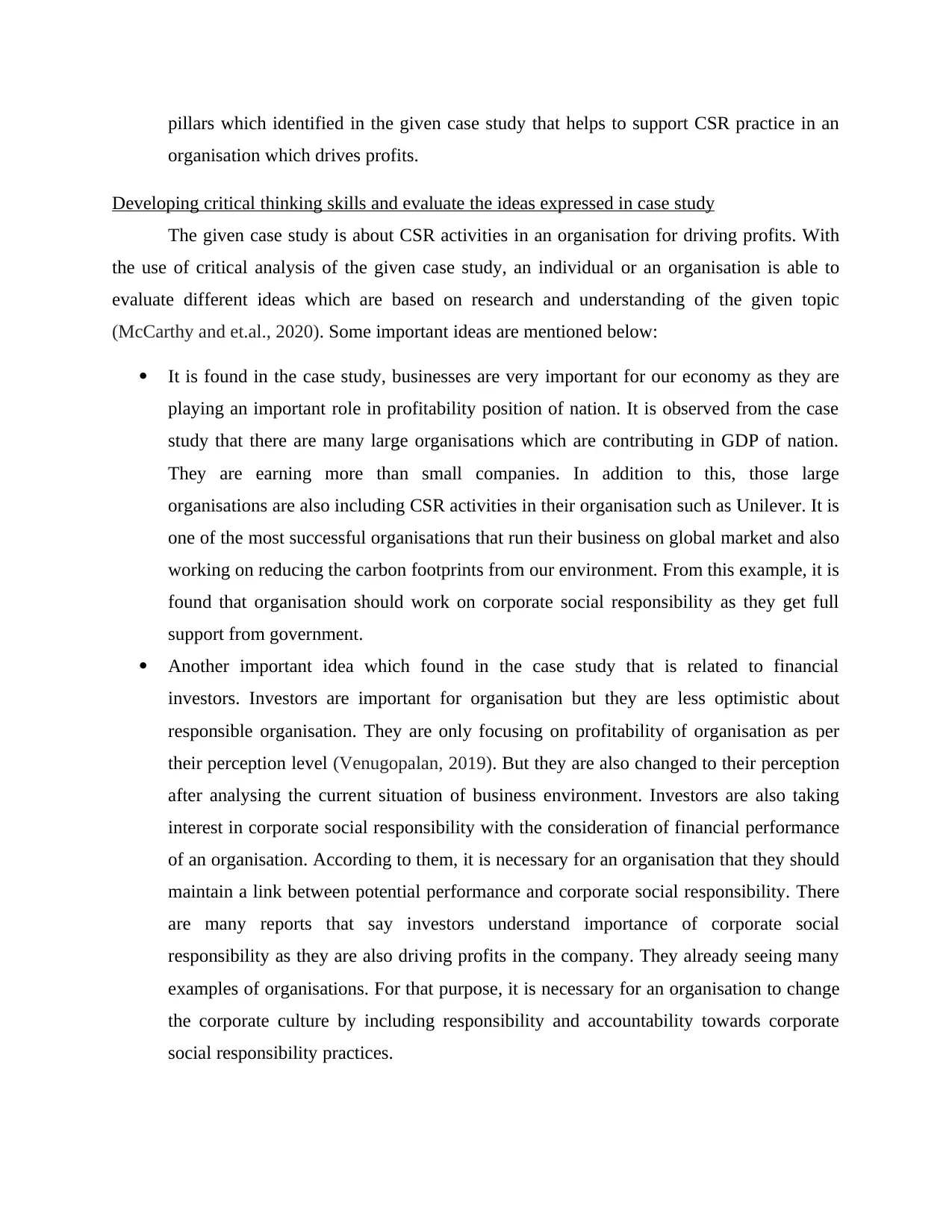
pillars which identified in the given case study that helps to support CSR practice in an
organisation which drives profits.
Developing critical thinking skills and evaluate the ideas expressed in case study
The given case study is about CSR activities in an organisation for driving profits. With
the use of critical analysis of the given case study, an individual or an organisation is able to
evaluate different ideas which are based on research and understanding of the given topic
(McCarthy and et.al., 2020). Some important ideas are mentioned below:
It is found in the case study, businesses are very important for our economy as they are
playing an important role in profitability position of nation. It is observed from the case
study that there are many large organisations which are contributing in GDP of nation.
They are earning more than small companies. In addition to this, those large
organisations are also including CSR activities in their organisation such as Unilever. It is
one of the most successful organisations that run their business on global market and also
working on reducing the carbon footprints from our environment. From this example, it is
found that organisation should work on corporate social responsibility as they get full
support from government.
Another important idea which found in the case study that is related to financial
investors. Investors are important for organisation but they are less optimistic about
responsible organisation. They are only focusing on profitability of organisation as per
their perception level (Venugopalan, 2019). But they are also changed to their perception
after analysing the current situation of business environment. Investors are also taking
interest in corporate social responsibility with the consideration of financial performance
of an organisation. According to them, it is necessary for an organisation that they should
maintain a link between potential performance and corporate social responsibility. There
are many reports that say investors understand importance of corporate social
responsibility as they are also driving profits in the company. They already seeing many
examples of organisations. For that purpose, it is necessary for an organisation to change
the corporate culture by including responsibility and accountability towards corporate
social responsibility practices.
organisation which drives profits.
Developing critical thinking skills and evaluate the ideas expressed in case study
The given case study is about CSR activities in an organisation for driving profits. With
the use of critical analysis of the given case study, an individual or an organisation is able to
evaluate different ideas which are based on research and understanding of the given topic
(McCarthy and et.al., 2020). Some important ideas are mentioned below:
It is found in the case study, businesses are very important for our economy as they are
playing an important role in profitability position of nation. It is observed from the case
study that there are many large organisations which are contributing in GDP of nation.
They are earning more than small companies. In addition to this, those large
organisations are also including CSR activities in their organisation such as Unilever. It is
one of the most successful organisations that run their business on global market and also
working on reducing the carbon footprints from our environment. From this example, it is
found that organisation should work on corporate social responsibility as they get full
support from government.
Another important idea which found in the case study that is related to financial
investors. Investors are important for organisation but they are less optimistic about
responsible organisation. They are only focusing on profitability of organisation as per
their perception level (Venugopalan, 2019). But they are also changed to their perception
after analysing the current situation of business environment. Investors are also taking
interest in corporate social responsibility with the consideration of financial performance
of an organisation. According to them, it is necessary for an organisation that they should
maintain a link between potential performance and corporate social responsibility. There
are many reports that say investors understand importance of corporate social
responsibility as they are also driving profits in the company. They already seeing many
examples of organisations. For that purpose, it is necessary for an organisation to change
the corporate culture by including responsibility and accountability towards corporate
social responsibility practices.
⊘ This is a preview!⊘
Do you want full access?
Subscribe today to unlock all pages.

Trusted by 1+ million students worldwide
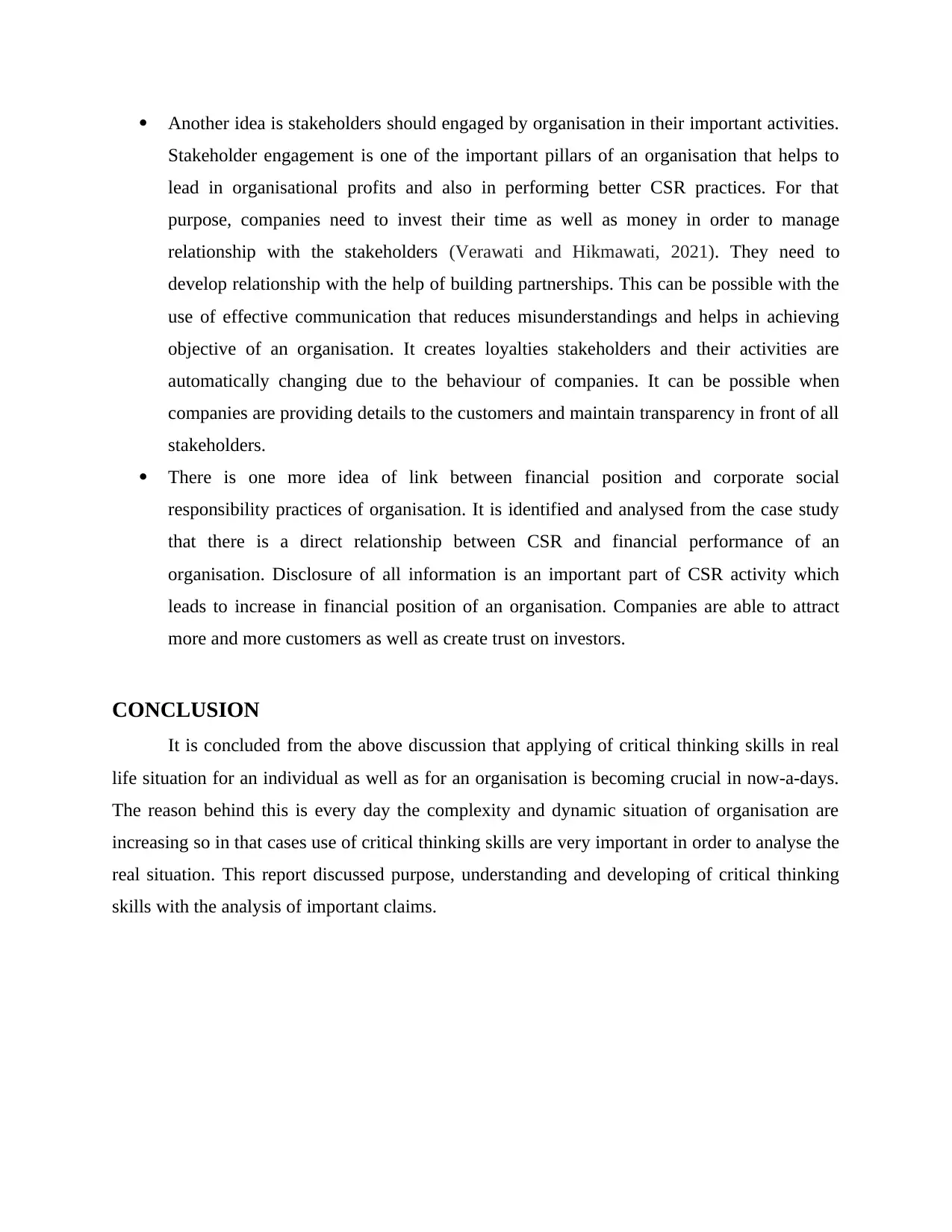
Another idea is stakeholders should engaged by organisation in their important activities.
Stakeholder engagement is one of the important pillars of an organisation that helps to
lead in organisational profits and also in performing better CSR practices. For that
purpose, companies need to invest their time as well as money in order to manage
relationship with the stakeholders (Verawati and Hikmawati, 2021). They need to
develop relationship with the help of building partnerships. This can be possible with the
use of effective communication that reduces misunderstandings and helps in achieving
objective of an organisation. It creates loyalties stakeholders and their activities are
automatically changing due to the behaviour of companies. It can be possible when
companies are providing details to the customers and maintain transparency in front of all
stakeholders.
There is one more idea of link between financial position and corporate social
responsibility practices of organisation. It is identified and analysed from the case study
that there is a direct relationship between CSR and financial performance of an
organisation. Disclosure of all information is an important part of CSR activity which
leads to increase in financial position of an organisation. Companies are able to attract
more and more customers as well as create trust on investors.
CONCLUSION
It is concluded from the above discussion that applying of critical thinking skills in real
life situation for an individual as well as for an organisation is becoming crucial in now-a-days.
The reason behind this is every day the complexity and dynamic situation of organisation are
increasing so in that cases use of critical thinking skills are very important in order to analyse the
real situation. This report discussed purpose, understanding and developing of critical thinking
skills with the analysis of important claims.
Stakeholder engagement is one of the important pillars of an organisation that helps to
lead in organisational profits and also in performing better CSR practices. For that
purpose, companies need to invest their time as well as money in order to manage
relationship with the stakeholders (Verawati and Hikmawati, 2021). They need to
develop relationship with the help of building partnerships. This can be possible with the
use of effective communication that reduces misunderstandings and helps in achieving
objective of an organisation. It creates loyalties stakeholders and their activities are
automatically changing due to the behaviour of companies. It can be possible when
companies are providing details to the customers and maintain transparency in front of all
stakeholders.
There is one more idea of link between financial position and corporate social
responsibility practices of organisation. It is identified and analysed from the case study
that there is a direct relationship between CSR and financial performance of an
organisation. Disclosure of all information is an important part of CSR activity which
leads to increase in financial position of an organisation. Companies are able to attract
more and more customers as well as create trust on investors.
CONCLUSION
It is concluded from the above discussion that applying of critical thinking skills in real
life situation for an individual as well as for an organisation is becoming crucial in now-a-days.
The reason behind this is every day the complexity and dynamic situation of organisation are
increasing so in that cases use of critical thinking skills are very important in order to analyse the
real situation. This report discussed purpose, understanding and developing of critical thinking
skills with the analysis of important claims.
Paraphrase This Document
Need a fresh take? Get an instant paraphrase of this document with our AI Paraphraser
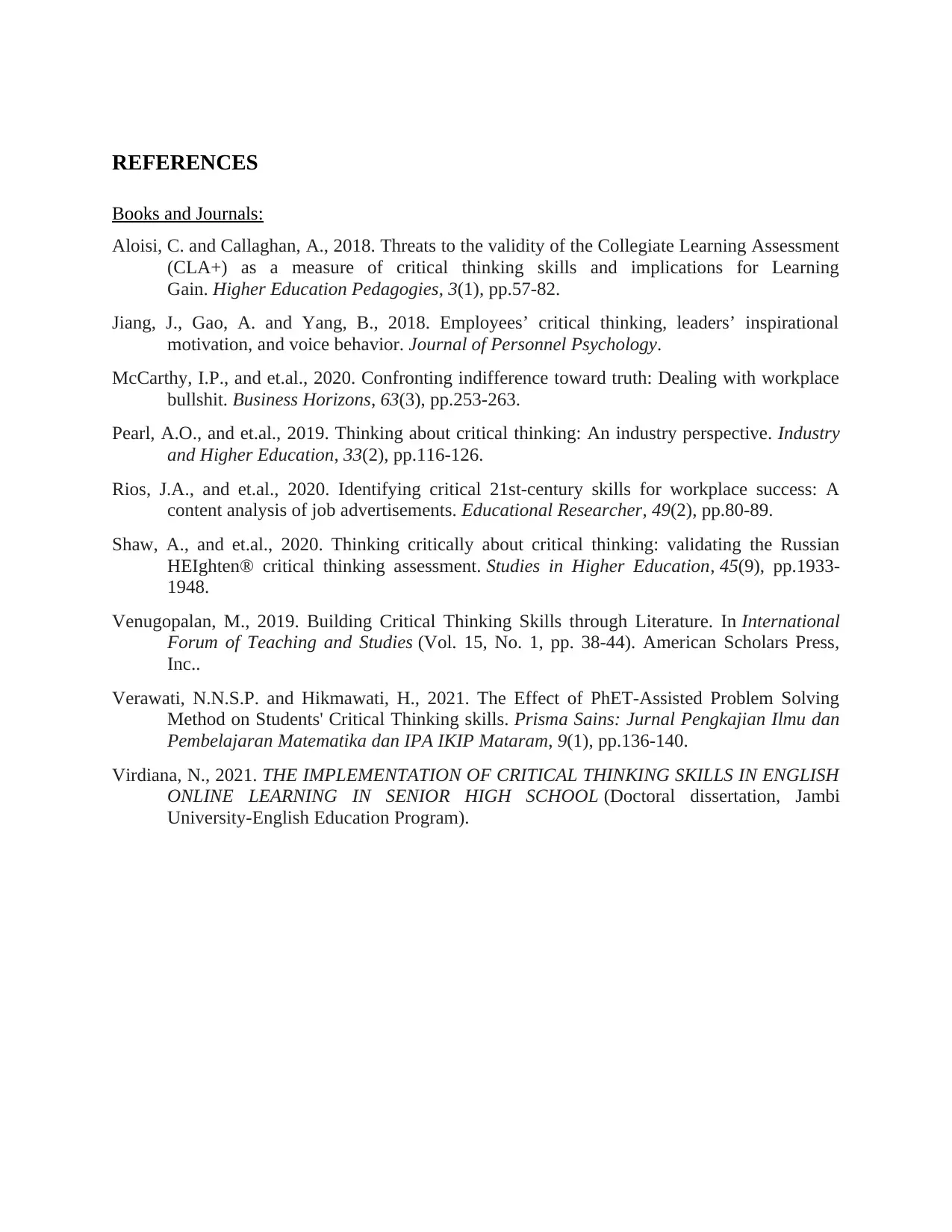
REFERENCES
Books and Journals:
Aloisi, C. and Callaghan, A., 2018. Threats to the validity of the Collegiate Learning Assessment
(CLA+) as a measure of critical thinking skills and implications for Learning
Gain. Higher Education Pedagogies, 3(1), pp.57-82.
Jiang, J., Gao, A. and Yang, B., 2018. Employees’ critical thinking, leaders’ inspirational
motivation, and voice behavior. Journal of Personnel Psychology.
McCarthy, I.P., and et.al., 2020. Confronting indifference toward truth: Dealing with workplace
bullshit. Business Horizons, 63(3), pp.253-263.
Pearl, A.O., and et.al., 2019. Thinking about critical thinking: An industry perspective. Industry
and Higher Education, 33(2), pp.116-126.
Rios, J.A., and et.al., 2020. Identifying critical 21st-century skills for workplace success: A
content analysis of job advertisements. Educational Researcher, 49(2), pp.80-89.
Shaw, A., and et.al., 2020. Thinking critically about critical thinking: validating the Russian
HEIghten® critical thinking assessment. Studies in Higher Education, 45(9), pp.1933-
1948.
Venugopalan, M., 2019. Building Critical Thinking Skills through Literature. In International
Forum of Teaching and Studies (Vol. 15, No. 1, pp. 38-44). American Scholars Press,
Inc..
Verawati, N.N.S.P. and Hikmawati, H., 2021. The Effect of PhET-Assisted Problem Solving
Method on Students' Critical Thinking skills. Prisma Sains: Jurnal Pengkajian Ilmu dan
Pembelajaran Matematika dan IPA IKIP Mataram, 9(1), pp.136-140.
Virdiana, N., 2021. THE IMPLEMENTATION OF CRITICAL THINKING SKILLS IN ENGLISH
ONLINE LEARNING IN SENIOR HIGH SCHOOL (Doctoral dissertation, Jambi
University-English Education Program).
Books and Journals:
Aloisi, C. and Callaghan, A., 2018. Threats to the validity of the Collegiate Learning Assessment
(CLA+) as a measure of critical thinking skills and implications for Learning
Gain. Higher Education Pedagogies, 3(1), pp.57-82.
Jiang, J., Gao, A. and Yang, B., 2018. Employees’ critical thinking, leaders’ inspirational
motivation, and voice behavior. Journal of Personnel Psychology.
McCarthy, I.P., and et.al., 2020. Confronting indifference toward truth: Dealing with workplace
bullshit. Business Horizons, 63(3), pp.253-263.
Pearl, A.O., and et.al., 2019. Thinking about critical thinking: An industry perspective. Industry
and Higher Education, 33(2), pp.116-126.
Rios, J.A., and et.al., 2020. Identifying critical 21st-century skills for workplace success: A
content analysis of job advertisements. Educational Researcher, 49(2), pp.80-89.
Shaw, A., and et.al., 2020. Thinking critically about critical thinking: validating the Russian
HEIghten® critical thinking assessment. Studies in Higher Education, 45(9), pp.1933-
1948.
Venugopalan, M., 2019. Building Critical Thinking Skills through Literature. In International
Forum of Teaching and Studies (Vol. 15, No. 1, pp. 38-44). American Scholars Press,
Inc..
Verawati, N.N.S.P. and Hikmawati, H., 2021. The Effect of PhET-Assisted Problem Solving
Method on Students' Critical Thinking skills. Prisma Sains: Jurnal Pengkajian Ilmu dan
Pembelajaran Matematika dan IPA IKIP Mataram, 9(1), pp.136-140.
Virdiana, N., 2021. THE IMPLEMENTATION OF CRITICAL THINKING SKILLS IN ENGLISH
ONLINE LEARNING IN SENIOR HIGH SCHOOL (Doctoral dissertation, Jambi
University-English Education Program).
1 out of 8
Related Documents
Your All-in-One AI-Powered Toolkit for Academic Success.
+13062052269
info@desklib.com
Available 24*7 on WhatsApp / Email
![[object Object]](/_next/static/media/star-bottom.7253800d.svg)
Unlock your academic potential
Copyright © 2020–2026 A2Z Services. All Rights Reserved. Developed and managed by ZUCOL.



